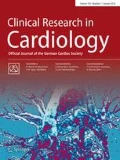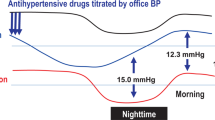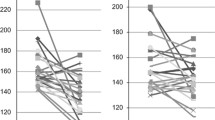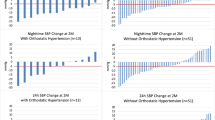Abstract
Background
Catheter-based renal denervation (RDN) reduces blood pressure (BP) throughout the 24-h period, as reported in several randomized sham-controlled trials. Reduction of BP in the early morning hours is especially important due to increased cardiovascular risks during that time.
Objective
In this report, we examine the impact of RDN on systolic BP (SBP) and diastolic BP (DBP) during the critical morning surge period in a post-hoc analysis of patients in the SPYRAL HTN-ON MED trial.
Methods and results
Ambulatory BP measurements were collected at baseline and 6 months for treatment and control patient groups over 24-h periods. Average morning BP surge is the difference between average morning BP and average nighttime BP, and the morning surge slope reflects the rate of change of BP from nighttime to morning. Mean morning DBP surge slopes were significantly lower for RDN vs. control groups at 6 months (1.1 vs. 3.6 mmHg/h; p = 0.029). In the RDN group, morning DBP surge slopes were significantly lower at 6 months compared to baseline (1.1 vs. 4.1 mmHg/h; p = 0.006). Similar patterns were observed for mean morning SBP surge slope but did not reach statistical significance.
Conclusions
This decrease in the morning DBP surge slope, an index of the sympathetically-mediated morning BP surge, thus indicates a drop in late morning BP relative to early morning/nocturnal BP in the RDN group. Thus, RDN appears effective in attenuating the slope of morning surge in DBP that might indicate possible benefits in a high-risk hypertensive population.
Clinical trial registration
https://www.clinicaltrials.gov (NCT02439775), registered May 12, 2015.



Similar content being viewed by others
References
Azizi M, Schmieder RE, Mahfoud F et al (2018) Endovascular ultrasound renal denervation to treat hypertension (RADIANCE-HTN SOLO): a multicentre, international, single-blind, randomised, sham-controlled trial. Lancet 391:2335–2345
Kandzari DE, Bohm M, Mahfoud F et al (2018) Effect of renal denervation on blood pressure in the presence of antihypertensive drugs: 6-month efficacy and safety results from the SPYRAL HTN-ON MED proof-of-concept randomised trial. Lancet 391:2346–2355
Townsend RR, Mahfoud F, Kandzari DE et al (2017) Catheter-based renal denervation in patients with uncontrolled hypertension in the absence of antihypertensive medications (SPYRAL HTN-OFF MED): a randomised, sham-controlled, proof-of-concept trial. Lancet 390:2160–2170
Bohm M, Kario K, Kandzari DE et al (2020) Efficacy of catheter-based renal denervation in the absence of antihypertensive medications (SPYRAL HTN-OFF MED Pivotal): a multicentre, randomised, sham-controlled trial. Lancet 395:1444–1451
Kario K, Bohm M, Mahfoud F et al (2018) 24-hour ambulatory blood pressure reduction patterns following renal denervation in the SPYRAL HTN-OFF MED trial. Circulation 138:1602–1604
Kario K (2005) Time for focus on morning hypertension: pitfall of current antihypertensive medication. Am J Hypertens 18:149–151
Kario K, Saito I, Kushiro T et al (2014) Home blood pressure and cardiovascular outcomes in patients during antihypertensive therapy: primary results of HONEST, a large-scale prospective, real-world observational study. Hypertension 64:989–996
Kario K, Saito I, Kushiro T et al (2016) Morning home blood pressure is a strong predictor of coronary artery disease: the HONEST study. J Am Coll Cardiol 67:1519–1527
Kandzari DE, Kario K, Mahfoud F et al (2016) The SPYRAL HTN Global Clinical Trial Program: Rationale and design for studies of renal denervation in the absence (SPYRAL HTN OFF-MED) and presence (SPYRAL HTN ON-MED) of antihypertensive medications. Am Heart J 171:82–91
Helfer AG, Michely JA, Weber AA, Meyer MR, Maurer HH (2015) Orbitrap technology for comprehensive metabolite-based liquid chromatographic-high resolution-tandem mass spectrometric urine drug screening—exemplified for cardiovascular drugs. Anal Chim Acta 891:221–233
Kario K, Bhatt DL, Brar S, Cohen SA, Fahy M, Bakris GL (2015) Effect of catheter-based renal denervation on morning and nocturnal blood pressure: insights from SYMPLICITY HTN-3 and SYMPLICITY HTN-Japan. Hypertension 66:1130–1137
Cheng HM, Wu CL, Sung SH et al (2017) Prognostic utility of morning blood pressure surge for 20-year all-cause and cardiovascular mortalities: results of a community-based study. J Am Heart Assoc 6:e007667
Bland JM, Altman DG (1986) Statistical methods for assessing agreement between two methods of clinical measurement. Lancet 1:307–310
Mahfoud F, Azizi M, Ewen S et al (2020) Proceedings from the 3rd European Clinical Consensus Conference for clinical trials in device-based hypertension therapies. Eur Heart J 41:1588–1599
Kario K, Pickering TG, Umeda Y et al (2003) Morning surge in blood pressure as a predictor of silent and clinical cerebrovascular disease in elderly hypertensives: a prospective study. Circulation 107:1401–1406
Kario K (2015) Prognosis in relation to blood pressure variability: pro side of the argument. Hypertension 65:1163–1169
Coccina F, Pierdomenico AM, Cuccurullo C et al (2019) Prognostic value of morning surge of blood pressure in middle-aged treated hypertensive patients. J Clin Hypertens (Greenwich) 21:904–910
Johnson AW, Hissen SL, Macefield VG, Brown R, Taylor CE (2016) Magnitude of morning surge in blood pressure is associated with sympathetic but not cardiac baroreflex sensitivity. Front Neurosci 10:412
Osborn JW, Banek CT (2018) Catheter-based renal nerve ablation as a novel hypertension therapy: lost, and then found, in translation. Hypertension 71:383–388
Kario K (2013) Proposal of a new strategy for ambulatory blood pressure profile-based management of resistant hypertension in the era of renal denervation. Hypertens Res 36:478–484
Kario K, Kim BK, Akoi J et al (2020) Renal denervation in Asia: consensus statement of the Asia Renal Denervation Consortium (ARDeC). Hypertension (in press)
Bristow JD, Honour AJ, Pickering GW, Sleight P, Smyth HS (1969) Diminished baroreflex sensitivity in high blood pressure. Circulation 39:48–54
Laterza MC, de Matos LD, Trombetta IC et al (2007) Exercise training restores baroreflex sensitivity in never-treated hypertensive patients. Hypertension 49:1298–1306
Zuern CS, Eick C, Rizas KD et al (2013) Impaired cardiac baroreflex sensitivity predicts response to renal sympathetic denervation in patients with resistant hypertension. J Am Coll Cardiol 62:2124–2130
Head GA, Chatzivlastou K, Lukoshkova EV, Jennings GL, Reid CM (2010) A novel measure of the power of the morning blood pressure surge from ambulatory blood pressure recordings. Am J Hypertens 23:1074–1081
Elliott WJ (1998) Circadian variation in the timing of stroke onset: a meta-analysis. Stroke 29:992–996
Kario K, Pickering TG, Hoshide S et al (2004) Morning blood pressure surge and hypertensive cerebrovascular disease: role of the alpha adrenergic sympathetic nervous system. Am J Hypertens 17:668–675
(2000) Major cardiovascular events in hypertensive patients randomized to doxazosin vs chlorthalidone: the antihypertensive and lipid-lowering treatment to prevent heart attack trial (ALLHAT). ALLHAT Collaborative Research Group. JAMA 283:1967–1975
Acknowledgements
Beth Ferri, PhD, CMPP provided editorial support, and Sandeep Brar, MD, Daiki Yasuhara, and Manuela Negoita, MD provided excellent study management, all of Medtronic.
Funding
Medtronic PLC, Santa Rosa, CA, USA.
Author information
Authors and Affiliations
Corresponding author
Ethics declarations
Conflict of interest
Prof Kario has received honoraria for lectures from Medtronic, Otsuka, and Daichisankyo, ReCor, and research fund/Grant from Omron Healthcare, A&D, and Fukuda Denshi. Dr. Weber has received consulting fees from Medtronic, ReCor, Ablative Solutions, Abbvie, Johnson &Johnson, Bristol-Myers Squibb, Conjupro, Regeneron and Urovent. Prof Böhm reports support from Abbott, Astra-Zeneca, Bayer, Boehringer-Ingelheim, Bristol-Myers Squibb, Medtronic, Novartis, ReCor, Servier, Vifor, and by the Deutsche Forschungsgemeinschaft (DFG, TTR 219, S-01, M-03, M-05). Dr. Townsend is a consultant to Medtronic and receives royalties from UpToDate. Prof Mahfoud has received speaker honoraria from Medtronic and Recor, and is supported by Deutsche Hochdruckliga, Deutsche Gesellschaft für Kardiologie and Deutsche Forschungsgemeinschaft. Prof Schmieder has received speaker and consulting honoraria from Medtronic, ReCor, Ablative Solutions, and Rox Medical. Prof Tsioufis has received honoraria for advisory boards and lectures from Medtronic, Servier, Bayer, Menarini, Novartis, Astra-Zeneca, Boehringer In, Pfizer, Pythagoras, Sanofi, and Amgen. Dr. Cohen and Mr. Fahy are employees and shareholders of Medtronic. Dr. Kandzari has received research/Grant support from Medtronic and Ablative Solutions, and consulting honoraria from Medtronic.
Electronic supplementary material
Below is the link to the electronic supplementary material.
Rights and permissions
About this article
Cite this article
Kario, K., Weber, M.A., Böhm, M. et al. Effect of renal denervation in attenuating the stress of morning surge in blood pressure: post-hoc analysis from the SPYRAL HTN-ON MED trial. Clin Res Cardiol 110, 725–731 (2021). https://doi.org/10.1007/s00392-020-01718-6
Received:
Accepted:
Published:
Issue Date:
DOI: https://doi.org/10.1007/s00392-020-01718-6




